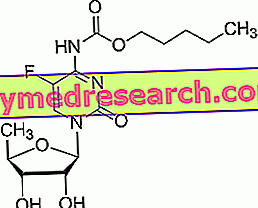Capecitabine is an anticancer drug belonging to the family of antimetabolites.

Capecitabine - Chemical Structure
It is in the list of essential drugs compiled by the World Health Organization, a list which lists all the drugs that must be present within a basic health system.
Indications
For what it uses
The use of capecitabine is indicated for the treatment of:
- Colon cancer and relapse prevention after the total surgical removal of the tumor mass;
- Cancer of the rectum;
- Stomach cancer;
- Breast cancer.
Warnings
Patients with the following conditions should definitely inform their doctor before starting capecitabine therapy:
- Liver disorders;
- Renal disorders;
- Cardiac disorders;
- Diabetes;
- Eye disorders;
- Neuropathy;
- Tumor spread in the brain;
- Alterations in the blood concentration of electrolytes;
- Dehydration;
- Nausea and vomiting in severe form that prevent food and water intake;
- Diarrhea in severe form.
The administration of capecitabine in patients with dihydropyrimidine dehydrogenase (DPD) deficiency should not be performed due to the increased risk of developing serious side effects.
The use of capecitabine in children and adolescents is not recommended.
Because capecitabine can cause dizziness, tiredness and nausea, the ability to drive and use machines is likely to be compromised.
Treatment with capecitabine should be stopped immediately if the following symptoms appear:
- Severe diarrhea, particularly if four or more discharges occur per day;
- In the event of more than one bout of vomiting in the course of 24 hours;
- Appearance of pain, redness, swelling or formation of ulcers in the mouth which are typical signs of the onset of stomatitis;
- Excessive loss of appetite;
- Body temperature above 38 ° C;
- Infection onset;
- Severe chest pain;
- Hand-foot syndrome.
Interactions
The concomitant administration of capecitabine and warfarin (an oral anticoagulant) may increase the risk of developing potentially fatal bleeding episodes.
The concomitant administration of capecitabine and radiotherapy may increase the toxicity of capecitabine itself.
Capecitabine may increase the plasma concentration of phenytoin (a drug used in the treatment of epilepsy), therefore patients being treated with the epilepsy in question must be carefully monitored.
Folic acid may cause an increase in the toxicity of capecitabine.
Some antacid drugs may cause a slight increase in the plasma concentration of capecitabine.
The concomitant use of capecitabine and allopurinol (a drug used for the treatment of gout) should be avoided, since the therapeutic efficacy of capecitabine itself could be reduced.
The concomitant administration of capecitabine and sorivudine or its analogues (drugs used to treat shingles) should be avoided, since sorivudine inhibits dihydropyrimidine dehydrogenase (DPD).
Side effects
Capecitabine may induce various side effects. The type of adverse effects and the intensity with which they occur varies from patient to patient, due to the great variability in response to chemotherapy that exists between one individual and another.
The main side effects that may occur during capecitabine therapy are listed below.
Oral cavity disorders
Treatment with capecitabine can cause pain and the appearance of ulcers in the oral cavity, whether or not associated with an alteration of the sense of taste. To prevent these symptoms, it is useful to take plenty of fluids and to perform regular tooth cleaning with a soft toothbrush several times a day.
Gastrointestinal disorders
Capecitabine therapy can cause nausea and vomiting that can be controlled with anti-emetic (antivomit) drugs. However, if these symptoms persist - despite the use of drugs - or if they occur in severe form, it is necessary to inform the doctor.
Capecitabine can also cause diarrhea which can occur both in moderate (1-2 shocks per day) and in severe form (4-6 shocks per day). This symptom can be kept under control through the use of antidiarrheal drugs, but - if it occurs in severe form - it may be necessary to stop the treatment. In any case, it is good to drink a lot in order to replenish lost fluids.
In addition, the drug can cause abdominal cramps, constipation, indigestion, intestinal bleeding, intestinal obstruction, inflammation of the intestine, stomach or esophagus, pain in the lower abdomen, heartburn, abdominal discomfort and may favor the onset of anorexia .
Hand-foot syndrome
Capecitabine therapy can cause hand-foot syndrome. This syndrome is characterized by a tingling sensation that occurs in the hands and feet followed by pain, redness, swelling and erythema.
Myelosuppression
Capecitabine can cause myelosuppression, ie it can cause bone marrow suppression. Consequently, there is a reduced haematopoiesis (reduced synthesis of blood cells) which can lead to:
- Anemia (reduced amount of hemoglobin in the blood);
- Leukopenia (reduced number of white blood cells) with consequent increased susceptibility to contraction of infections;
- Plateletopenia (reduced number of platelets) with increased risk of bleeding.
Hepatobiliary disorders
Treatment with capecitabine can cause liver dysfunction, cholestatic hepatitis, liver failure and jaundice.
Nervous system disorders
Capecitabine therapy can cause insomnia, depression, drowsiness, dizziness, dizziness, headache, numbness or tingling of the skin, difficulty in speaking, impaired memory, loss of coordination in movement, balance disorders, neuropathy and sensory disturbances.
Moreover, the drug can promote the appearance of confusional states, panic attacks, depressed mood and decreased libido.
Eye disorders
Capecitabine can cause eye irritation, increased lacrimation, tear duct stricture, conjunctivitis, blurred vision and double vision.
Cardiovascular disorders
Following capecitabine treatment, arrhythmias, palpitations, chest pain, infarction, hypotension or hypertension and prolongation of the QT interval (the interval of time required for the ventricular myocardium to depolarize and repolarize) may occur.
Skin and subcutaneous tissue disorders
Capecitabine can cause skin dryness, itching, rash, alopecia, redness of the skin, inflammation of the skin, ulcers or blisters, photosensitivity reactions and nail changes.
Respiratory disorders
Treatment with capecitabine may promote the onset of cough (with or without blood), shortness of breath, infections of the lungs and respiratory tract (such as pneumonia and bronchitis), lung collapse, asthma and exertional dyspnea.
Kidney and urinary tract disorders
Capecitabine therapy can induce fluid accumulation in the kidneys, increase the frequency of urination during nocturnal rest (nocturia), incontinence, urination difficulties and kidney dysfunctions with the appearance of blood or protein in the urine.
Other side effects
Other side effects that may arise following capecitabine therapy are:
- Allergic reactions in sensitive subjects;
- Dehydration;
- thrombophlebitis;
- arthralgia;
- Temperature;
- Chills;
- Edema;
- Feeling unwell;
- Increased blood levels of triglycerides and sugars;
- Decreased blood levels of potassium (hypokalemia), sodium (hyponatremia), calcium (hypocalcemia) and / or magnesium (hypomagnesemia);
- Bone pain;
- Muscle weakness or stiffness;
- Muscle spasms;
- Ear pain;
- Hearing loss;
- Tinnitus (ie the perception of buzzing, whistling, hissing, tinkling, etc.);
- Alterations of the voice;
- Sweating and night sweats.
Overdose
In case of overdose with capecitabine, the symptoms that may appear are nausea, vomiting, diarrhea, bone marrow depression, inflammation or ulceration of the intestine and / or mouth, pain or bleeding from the intestine and / or stomach.
In case you suspect you have taken an overdose of medication, you must contact a doctor immediately and contact the nearest hospital.
Action mechanism
Capecitabine is an antimetabolite agent. It is a prodrug, that is, it has no pharmacological activity per se, but must be metabolised by specific enzymes to be transformed into the active drug.
In particular, capecitabine - following enzymatic metabolism - is converted into 5-fluorouracil, a drug already used in cancer therapy as such.
Once 5-fluorouracil is produced, it performs its antitumor action in three different ways:
- Inhibits thymidylate synthase, a fundamental enzyme in DNA synthesis;
- It binds to RNA, thus giving rise to an abnormal RNA;
- It inhibits the synthesis of new RNA by blocking one of the enzymes involved in this operation: uracil phosphatase.
Since DNA and RNA are fundamental for the life of cells, inhibiting their synthesis induces an unbalanced cell growth that leads to the death of the cell itself.
Mode of Use - Posology
Capecitabine is available for oral administration in the form of light pink or peach tablets, depending on the amount of active ingredient they contain.
The tablets should be taken whole - without chewing - with a glass of water within thirty minutes of a meal.
The dosage of capecitabine must be established by the doctor on the basis of the patient's body surface, according to the patient's condition and according to the type and severity of the pathology to be treated.
In patients with moderate or severe renal impairment a reduction in the dose of the drug administered may be necessary.
Generally, the usual dose used in adults is 1250 mg / m2 of body surface area per day, to be taken in two divided doses.
Usually, a course of therapy lasts 21 days, of which, 14 days include the intake of capecitabine, while the remaining 7 constitute a pause period during which the drug should not be taken.
If capecitabine is given in combination with other anticancer drugs, a reduction in the dose of medication usually administered may be necessary.
Pregnancy and breastfeeding
Because of the possible damage that capecitabine can cause to the fetus, the drug should not be used in pregnant women, whether known or suspected.
Because capecitabine can be excreted in breast milk, breastfeeding mothers should not take the medicine.
Contraindications
The use of capecitabine is contraindicated in the following cases:
- Known hypersensitivity to capecitabine;
- In the case of patients with excessively low levels of white blood cells and platelets;
- In patients suffering from severe liver and / or renal diseases;
- In patients with established DPD deficiency;
- In patients who have taken drugs used to treat shingles in the last four weeks;
- In children and adolescents;
- Pregnant;
- During breastfeeding.



